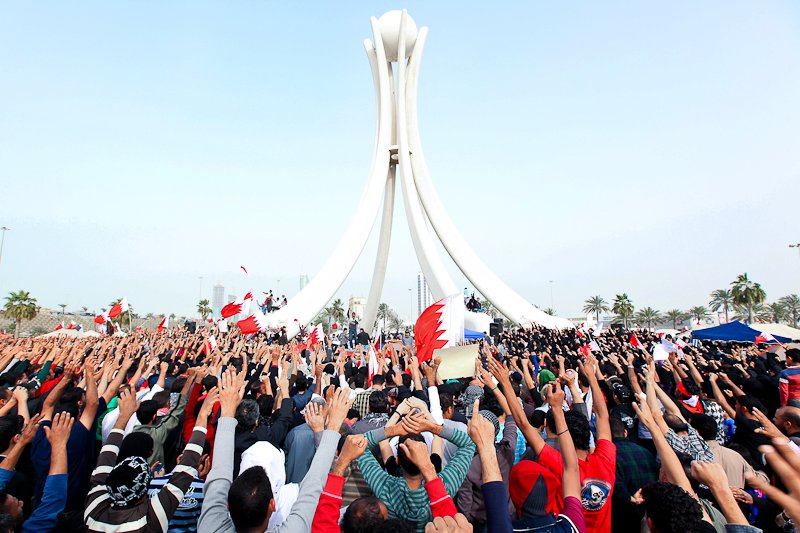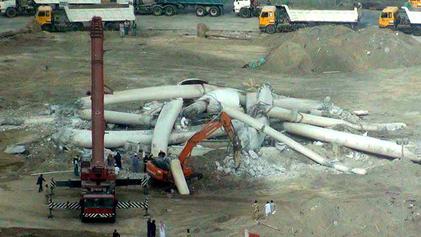On December 17, 2010, a street vendor named Mohamed Bouazizi set himself on fire in protest. Four weeks later, Tunisia's Zine al-Abidine Ben Ali was gone. Protests spread to Egypt, Bahrain, Yemen, Libya, and Syria. Some successfully ousted their autocratic leaders, some were brutally repressed, and others are ongoing. In almost all cases, the final outcome is still up in the air. More than one year on, how have the countries of the Arab Spring fared?
Read Part 1 on Tunisia and Egypt here.

Change in rank in the Economist's Democracy Index: ↑ 33
With the help of NATO air support, Libyan rebels were able to overthrow Gaddafi's regime, taking Tripoli in August. After Gaddafi was killed in October, the National Transitional Council (NTC) declared Libya officially liberated.
The NTC is currently setting up elections for the National Assembly to be held in June. (The NTC has set up a government that will run the country in the interim.) The National Assembly is charged with writing a new constitution. Under the most recent election law, two-fifths of the seats will be filled by political parties with the remainder filled by independents. The final law dropped a 10% quota for women and reversed the decision to allow only independents to run. Electoral districts will be set up in the next few weeks.
The revolution has also unfortunately created a host of problems for the NTC and the region. Protesters in Benghazi have decried both the slow rate of progress and the inclusion of people like the NTC's vice president Abdel Hafiz Ghoga, who participated in the Gaddafi regime. (Ghoga has since resigned.) There have been clashes between the various rebel militias, between the rebel militias and the NTC army, and between Gaddafi loyalists and the NTC. Gaddafi loyalists even temporarily retook the town of Bani Walid two weeks ago. Proliferation of weapons, including portable, anti-aircraft weapons known as MANPADs, is a concern. And the influx of Tuareg rebels, fresh from fighting for Gaddafi, are causing problems in nearby Mali.
The lack of security and cohesion is disconcerting, but Libya is on the path of democratization. And according to Reuters, a recent poll says 80% of Libyans say their country is on the right track and 76% want a democratically elected government. Hopefully, the militias will view the National Assembly elected in June as legitimate and lay down their arms. But that will take both luck and pressure.

Change in rank in the Economist's Democracy Index: ↓ 22
The Arab Spring came to the tiny island nation of Bahrain on February 14. On that day, protesters clashed with police, leaving over 20 injured and one dead. The opposition al-Wefaq party quit Parliament. Suppression continued until troops left the Pearl Roundabout (shown above), which had become the focal point of the rebellion.
Though Bahrain is predominantly Shia, the royal family is Sunni. And while protests drew both Sunnis and Shiites at first, the government fostered a "sectarian divide" in the words of a prominent Shiite sheik.
At the request of the Bahraini government, Saudi Arabia and the United Arab Emirates sent troops into the country on March 14 to restore order. Two days later, the protests were quashed and a curfew was established. There were reports of troops surrounding a hospital, preventing doctors and nurses from leaving and the wounded from entering. Opposition leaders were arrested. The government even tore down the iconic Pearl Monument.

Since then, the Bahraini government offered half-hearted calls to dialogue, as smaller demonstrations continued in Shia neighborhoods outside of the capital of Manama.
The United States, while rightfully condemning the violence, has not called for regime change as it has in other Arab Spring nations. Bahrain is perceived to be a strong ally in the West's struggles with Iran, and Manama houses the U.S. Navy's Fifth Fleet. In the case of Bahrain, the U.S. has allowed its strong, short-term interests dictate its foreign policy.
Now, protesters are preparing to go back to the streets to mark the one-year anniversary of the uprising. They are amassing in an area outside of Manama set aside for opposition rallies dubbed "Freedom Square" to convey the same spirit of the Pearl Roundabout. In anticipation, the government has again called for a dialogue. In any case, the protests that perhaps seemed quashed a few months ago are far from over.
Read Part Three on Yemen.

